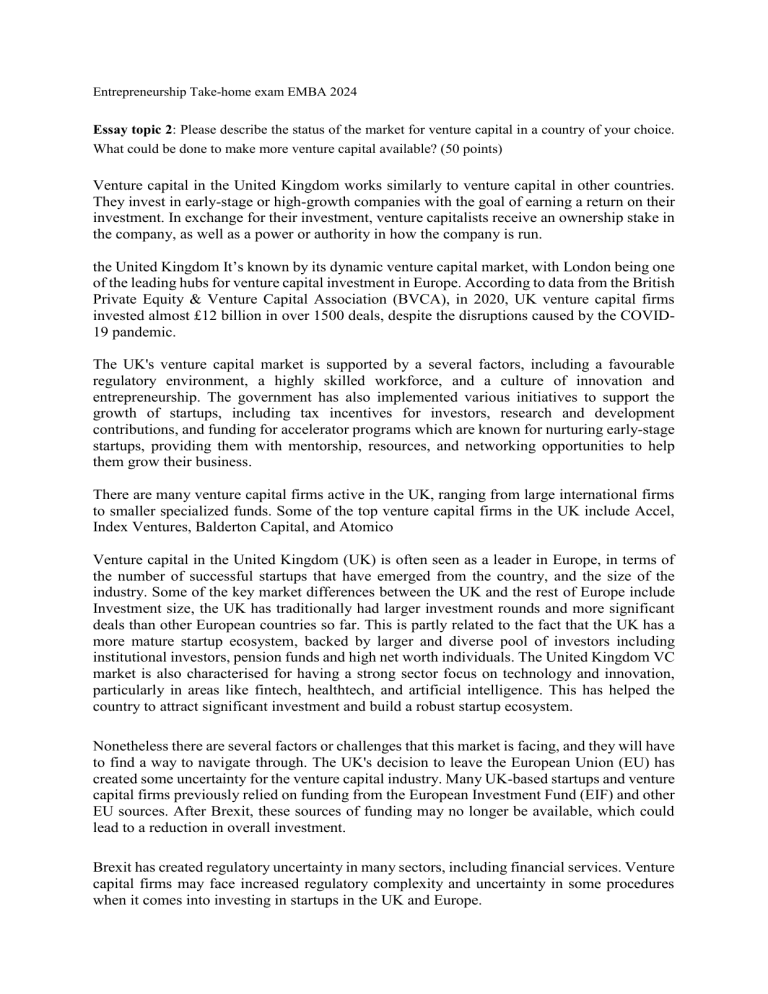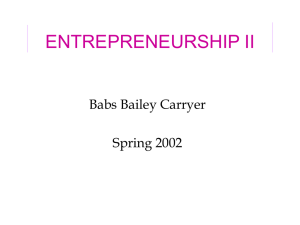
Entrepreneurship Take-home exam EMBA 2024 Essay topic 2: Please describe the status of the market for venture capital in a country of your choice. What could be done to make more venture capital available? (50 points) Venture capital in the United Kingdom works similarly to venture capital in other countries. They invest in early-stage or high-growth companies with the goal of earning a return on their investment. In exchange for their investment, venture capitalists receive an ownership stake in the company, as well as a power or authority in how the company is run. the United Kingdom It’s known by its dynamic venture capital market, with London being one of the leading hubs for venture capital investment in Europe. According to data from the British Private Equity & Venture Capital Association (BVCA), in 2020, UK venture capital firms invested almost £12 billion in over 1500 deals, despite the disruptions caused by the COVID19 pandemic. The UK's venture capital market is supported by a several factors, including a favourable regulatory environment, a highly skilled workforce, and a culture of innovation and entrepreneurship. The government has also implemented various initiatives to support the growth of startups, including tax incentives for investors, research and development contributions, and funding for accelerator programs which are known for nurturing early-stage startups, providing them with mentorship, resources, and networking opportunities to help them grow their business. There are many venture capital firms active in the UK, ranging from large international firms to smaller specialized funds. Some of the top venture capital firms in the UK include Accel, Index Ventures, Balderton Capital, and Atomico Venture capital in the United Kingdom (UK) is often seen as a leader in Europe, in terms of the number of successful startups that have emerged from the country, and the size of the industry. Some of the key market differences between the UK and the rest of Europe include Investment size, the UK has traditionally had larger investment rounds and more significant deals than other European countries so far. This is partly related to the fact that the UK has a more mature startup ecosystem, backed by larger and diverse pool of investors including institutional investors, pension funds and high net worth individuals. The United Kingdom VC market is also characterised for having a strong sector focus on technology and innovation, particularly in areas like fintech, healthtech, and artificial intelligence. This has helped the country to attract significant investment and build a robust startup ecosystem. Nonetheless there are several factors or challenges that this market is facing, and they will have to find a way to navigate through. The UK's decision to leave the European Union (EU) has created some uncertainty for the venture capital industry. Many UK-based startups and venture capital firms previously relied on funding from the European Investment Fund (EIF) and other EU sources. After Brexit, these sources of funding may no longer be available, which could lead to a reduction in overall investment. Brexit has created regulatory uncertainty in many sectors, including financial services. Venture capital firms may face increased regulatory complexity and uncertainty in some procedures when it comes into investing in startups in the UK and Europe. Changes to immigration policy with the Brexit may make it more difficult for UK-based startups to attract top talent from other EU countries. This could make it harder for these startups to scale and grow, potentially reducing their attractiveness to venture capital investors. While there are certainly risks associated with Brexit, there may also be some opportunities for the UK venture capital industry. For example, Brexit may allow the UK government to create more favourable tax and regulatory policies for venture capital firms and startups, which could help to attract more investment. Some investors may be cautious in the short term, but there may also be opportunities for innovation and growth in the years ahead. One of the key challenges facing the UK VC market is the lack of diversity in different type of sectors of startups that receive funding. Many VCs tend to focus on a narrow range of industries, such as fintech, biotech, and software. This means that promising startups in other sectors, such as manufacturing, retail, or agriculture, may struggle or find very difficult to attract investment. To fix this issue, in my opinion Venture Capitalists need to be more open in the idea of diversifying their portfolio and willing to invest in a broader range of sectors. Another problem from years ago found and still in place in the United Kingdom is the regional imbalance in VC funding. London and the Southeast of England are the biggest portion or the majority of VC investments, while other regions, such as the North West and the Midlands, receive much more less. This can create a vicious cycle, where startups in these regions will find difficult to grow and to attract investment due to the perception that they are located in a less dynamic part of the country. To address this, more needs to be done to promote regional investment and support the development of local ecosystems. Access to capital it is still considered a significant challenge for startups in the UK, compared to other markets like in the US. While there is a lot of venture capital available, it can be difficult for startups to access it. This is especially true for early-stage companies, which may find a big hurdle to convince VCs to invest in them. More could be done to support early-stage startups, such as providing more and not limiting tax incentives for investors or setting up government-backed investment funds. There are several ways that the venture capital (VC) ecosystem in the United Kingdom can be improved. Here are some suggestions: The UK venture capital industry has historically struggled with diversity and inclusion, particularly in terms of gender and ethnicity. The UK VC market is still dominated by white men, with women and minority groups underrepresented in both the VC industry and the startups that receive funding. This not only limits the potential of these startups but also contributes to a lack of diversity in the wider economy. Campaigns are needed to promote diversity and inclusion in the VC industry and to support startups founded by women and underrepresented groups. By Encouraging greater diversity and inclusion it could help to unlock new sources of talent and innovation, which could in turn drive more investment in the sector. The government could support initiatives, such as mentorship programs or funding for underrepresented founders. The need to Increase transparency There is a lack of transparency observed and perceived in the VC industry, which can lead to misunderstandings and mistrust between startups and investors. VC firms could improve transparency by being more open about their investment criteria and decision-making processes with clear communication. Provide more support for early-stage startups, as many early-stage startups find difficult to secure funding, and without this support, they may not be able to grow and succeed. The UK government and VC firms should consider offering more support for early-stage startups, such as mentorship, training, and networking opportunities and additional startup accelerators and incubators. Increase funding availability or seed capital, although the UK has a thriving VC ecosystem, there is still room for improvement in terms of the amount of funding available. To address this, the government could provide more tax incentives or other financial support to encourage more private investment in startups. Encouraging greater investment from institutional investors like Pension funds, insurance companies, and other institutional investors have large amounts of capital that they could potentially allocate towards venture capital funds. However, many of these investors are hesitant to do so due to concerns about risk and uncertainty. The UK government could work to encourage these investors to allocate a greater portion of their portfolios towards VCs. Improving access to global capital even though the UK is home to many successful venture capital firms, there is still significant capital available outside of the country. The government could work to promote the UK as an attractive destination for international investors, potentially through targeted marketing campaigns or by improving regulatory frameworks. Promote more innovation hubs, I believe the UK government could promote innovation hubs in major cities across the country, which can attract startups and venture capital investment. Create closer relationships between educational institutions and industry, the UK has some of the world's best universities, and closer collaboration between academia and industry could help to drive innovation and create more successful startups. The government could provide funding to encourage collaboration between universities and businesses, and VC firms could offer more support to startups founded by academics. More Streamlining of regulations as these can be a significant barrier to entry for new venture capital firms, particularly those that are smaller or less established. The government could consider streamlining regulations to make it easier for new firms to enter the market and compete with established players. In conclusion, while the UK VC market is one of the largest and most dynamic in Europe, there is still room for improvement. To make venture capital more readily available, VCs need to be more open and willing to invest in a broader range of sectors and provide more transparency. More needs to be done to promote regional investment, support early-stage startups, and promote diversity and inclusion in the VC industry. By addressing these issues, the UK can continue to be a leader in the global startup ecosystem and drive innovation and growth in the wider economy.




